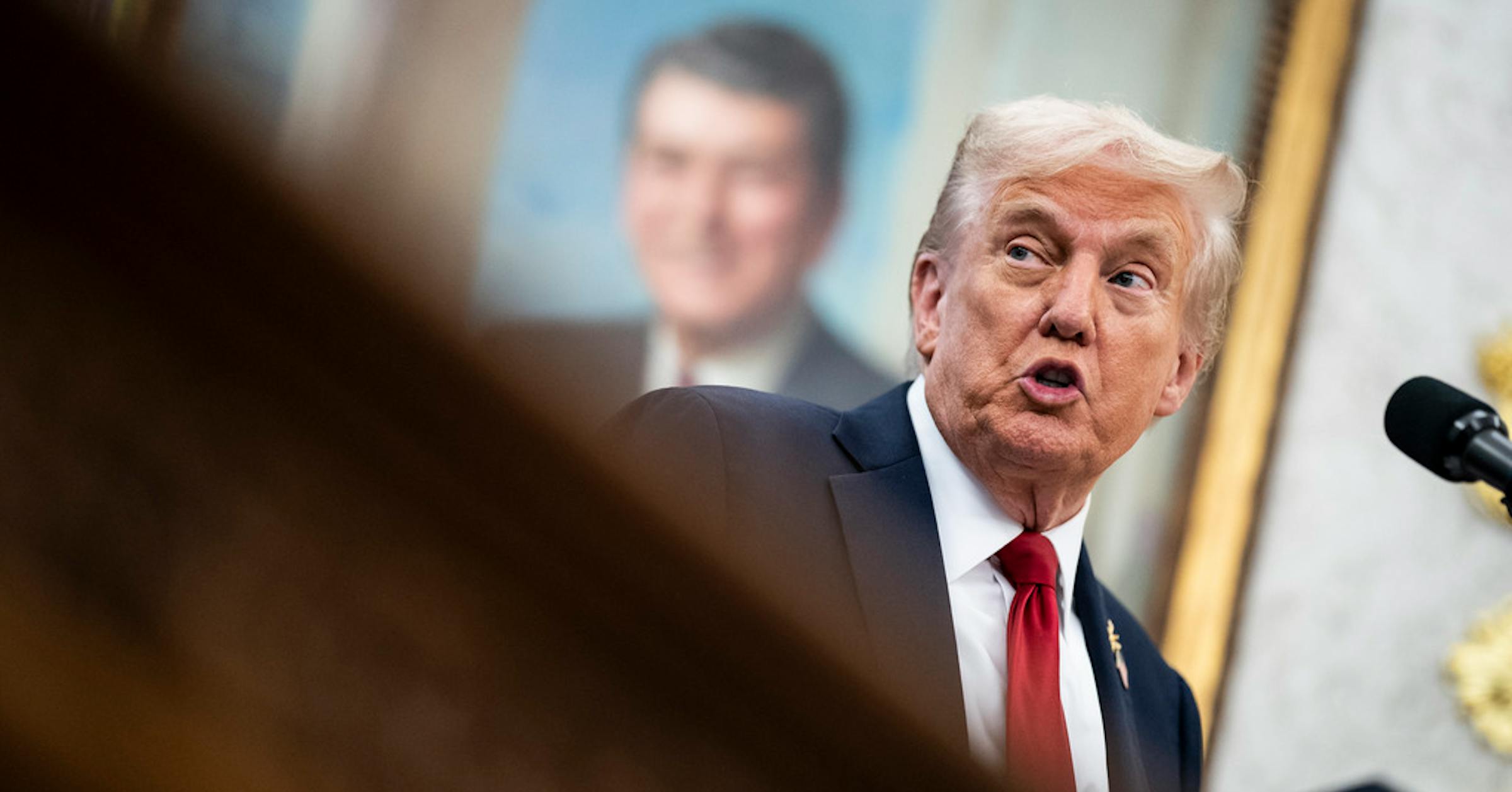
Senior federal officials have quietly counseled several agencies against firing employees while the government is shut down — as President Donald Trump has suggested he will — warning the strategy may violate appropriations law, according to two people familiar with the matter who spoke on the condition of anonymity to discuss sensitive internal deliberations.
The officials cautioned that firings — known as RIFs, or reductions in force — could be vulnerable to legal challenges under statutes labor unions cited this week in a lawsuit seeking to block threatened mass layoffs. For example, the Antideficiency Act prohibits the federal government from obligating or expending any money not appropriated by Congress. It also forbids incurring new expenses during a shutdown, when funding has lapsed; some federal government officials have concluded the prohibition could extend to the kind of severance payments that accompany reductions in force.
Trump and White House Budget Director Russell Vought, whose office oversees apportionment law and has led the administration’s preparation for terminations, have repeatedly said mass dismissals would come during a government shutdown. Plans for such firings have been developed at several agencies, according to two federal officials familiar with the matter who, like others interviewed for this article, spoke on the condition of anonymity to detail internal conversations. Those plans, which have yet to take effect, dictate smaller reductions in force than what the White House has projected.
Asked about the legal concerns, White House Office of Management and Budget communications director Rachel Cauley said in a written statement that “issuing RIFs is an excepted activity to fulfill the President’s constitutional authority to supervise and control the Executive Branch, similar to conducting foreign policy.”
The warnings from top officials are at odds with the confident rhetoric that has emerged from the White House in recent days as administration officials have sought to use the stalemate with Democratic leaders to their advantage. Leaders of both parties are working to blame their political opponents for any fallout, as the federal government remained shut down Thursday with no votes planned.
The shutdown has temporarily furloughed around 750,000 federal workers and completely shuttered several agencies, including the Department of Education, the Commerce Department, the Labor Department and the State Department. National parks will largely remain open, though visitor centers, parking lots and museums will be closed. Programs that are not funded by annual appropriations laws such as Social Security and the U.S. Postal Service will continue, as will work necessary to national security and defense.
The closures and threatened layoffs compound a difficult year for federal workers, who have seen hundreds of thousands of their colleagues depart through firings, retirement programs and a deferred resignation offer the administration developed. The last initiative led to more than 150,000 people leaving federal service, the Washington Post reported. This week, as the government slammed to a halt, federal workers were navigating missed paychecks and unclear instructions about where and how to keep working.
Trump indicated Tuesday that he would inflict pain on programs and workers that Democrats prioritize as a result of the shutdown. Days later, he tempered his threats by saying he was still considering whether the cuts would be temporary or permanent.
“I have a meeting today with Russ Vought, he of PROJECT 2025 Fame, to determine which of the many Democrat Agencies, most of which are a political SCAM, he recommends to be cut, and whether or not those cuts will be temporary or permanent,” Trump said Thursday on Truth Social. “I can’t believe the Radical Left Democrats gave me this unprecedented opportunity.”
“We are going to have to lay some people off if the shutdown continues,” he told reporters. “We don’t like that. We don’t necessarily want to do it, but we’re going to do what we have to do to keep the American people’s essential services continuing to run.”
Vance did not elaborate on how laying off federal workers would help preserve federal services. There is no legal requirement that the government fire employees during a shutdown, and such action has never been taken as a result of a shutdown.
Federal employment lawyers said the dismissals would almost certainly be illegal, violating rules that guide the process of federal layoffs. Federal regulations governing reductions in force (RIFs) say that agencies can dismiss employees for one of several reasons, including a lack of work, a reorganization or a shortage of funds.
“But that has never been interpreted to refer to a temporary lapse of funding because of Congress not getting its act together and causing some sort of shutdown,” said Debra D’Agostino, founding partner of a law firm devoted to representing federal employees.
The federal government remained shut down Thursday amid an ongoing, bitter partisan battle over funding laws. Senate Democrats are saying they will not vote to reopen government unless Republicans agree to extend health care subsidies slated to expire this year, but Republicans say they will not negotiate on policy issues until the government is funded again.
Regulations say that employees must be given 60 days advance notice of their layoff. What if the shutdown ends up lasting for 12 days, D’Agostino asked, “Or 12 hours? Three hours? I just can’t see how they tomorrow spit out notices saying you’re fired because of no funding, and then on Friday, we have funding again.”
Several federal unions sued the Office of Management and Budget and the Office of Personnel Management on Tuesday over threats of mass firings, urging a federal court to block any such plans. The unions argued that agencies have no statutory authority to implement RIFs during a shutdown and have not provided proper justification, echoing the concerns raised by some administration officials.
“I have stopped trying to predict what the courts will be doing,” Owen said. “I know what they should be doing based on existing case law. But we’re not in those times right now.”
Nonetheless, Owen predicted the Trump administration would end up reversing most RIF actions it tries to undertake during the shutdown. Over the past several months, he noted, he has represented many federal workers dismissed by Trump whose firings have since been rescinded as apparent mistakes.
Alex Brandon/The Associated Press
President Donald Trump has seized on the government shutdown as an opportunity to reshape the federal workforce and punish detractors, meeting with budget director Russ Vought on Thursday to talk through ”temporary or permanent” spending cuts that could set up a lose-lose dynamic for Democratic lawmakers.



